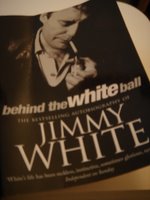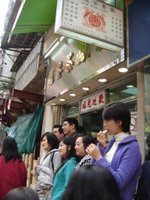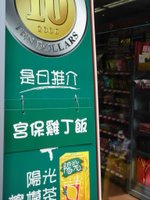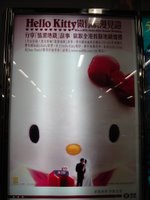 「一生物業」,這個店名真有趣,有趣在有點自相矛盾,如果人人一生僅擁有同一座物業,以佣金收入為生的物業代理公司恐怕要關門大吉。奶茶怪查看究竟有幾多公司是以「一生」命名,答案是不多。
「一生物業」,這個店名真有趣,有趣在有點自相矛盾,如果人人一生僅擁有同一座物業,以佣金收入為生的物業代理公司恐怕要關門大吉。奶茶怪查看究竟有幾多公司是以「一生」命名,答案是不多。
根據香港網上黃頁的搜尋結果,只有三間 -- 一生秀麗是健康食品公司、浪漫一生是辦婚紗攝影的,還有一生日本料理,這個令人摸不著頭腦,可能在日文有特別意思。相反,公司以「今日」命名的有十二間之多。無論如何,「一生」都不是一個熱門的公司名稱,是大部分公司不願意為自己的產品作出長遠的保證嗎? 如果有一間超市叫「一生超市」的,而又如其名為顧客的每餐飯餸著緊,其食物應該不用吃壞人吧。
When an investment market opens up, frenzy comes and the securities prices shoot through the roof. Such an intelligent man as Isaac Newton got his fingers burnt as a market bubble burst in his time. i believe the recent market excitement happening in China and Hong Kong stock markets would lead to disappointment for many investors. Optimists back today's high valuations of China-related stocks saying that the country's economy in its best shape justifies even higher valuations. But the linkage between economy and investment could be weaker than many people think. i agree that China is formidable going forward. Still, the market is likely to fall. An investor who bets on China's great future is investing for a good economic reason but at the wrong moment.
The mere opening of the access of something that looks classy invokes emotional crowds. Consider some daily observations. The opening of the first Hong Kong branches of Japanese stores -- Mos Burger and Uniqlo, and the opening of Hong Kong Disneyland brought many people who didn't want to lag behind. The opening of the Lowu border to individual tourists also drew unprecedented enthusiasm. The opening of an investment market has similar impact on investors' sentiment. The tulip mania in the Netherlands in the 17th century was a classic example.
Trading in tulips had become a business since a botanist succeeded in planting the Turkish flowers in Dutch soils in late 16th century. Elites collected luxurious tulips just like today's rich and powerful keep variegated carps. However, the phenomenal surge of tulip prices did not happen until stock exchanges listed tulip interest as securities and futures contracts, making trading of the flowers available to the public in the early 1630's. The tulip market collapsed in 1637.
China's world-class shares that used to be available for Hong Kong and international investors only are now open to mainland investors through "A-share" listing in mainland's exchanges. That has triggered speculative interest. Such interest also has its impact on the Hong Kong bourse.
Looking back, we might laugh at those tulip investors for their stupidity to invest in useless flowers. Tulip investors, or traders, did not mind buying expensive flowers as long as they believed that someone else would buy them at even higher prices in the future.
Today, investors who trade Chinese shares are no pure traders. They buy them for a good reason -- China's bright economic outlook. However, history shows us that a good reason fell short of justifying an investment. China's economic prospects are as good as, if not better than, Hong Kong's in the 1970's, when the city was under development. Still, the Hong Kong market took a spike and suffered a crash in 1973, leaving many investors broke. During that booming period preceding the crash, the big hit was a stock called Hong Kong Antenna. The share price ballooned 50 times on the debut day.
Hong Kong Antenna was a typical concept stock. The reason for buying Hong Kong Antenna was no less compelling than any investment ideas ever. In those years, television broadcast had just become popular. Just imagine every household would buy an antenna from that company. You would have brought the stock for that idea. True, for the years that followed, every household did have a television. The reason to buy was good. But it was later found that the household did not need private antenna because all households in a building could share a common antenna. The investment in Hong Kong Antenna was wrong.
We learnt from the lesson not to buy small companies. Buy the big ones. But the big ones can run into trouble just like the small ones. In 2000, Americans sought Yahoo -- a giant in the dot-com industry. Yahoo was young and revolutionary. Yet, the following industry development was unpredictable. Googles emerged to change the ecology. Today, Yahoo's share price has yet to go back to its 2000 peak.
Hong Kong's PCCW was a regional heavyweight under the leadership of Richard Li who had the ambition to turn every television into a computer. Now, seven years are gone and such television-computer convergence is in sight. However, the hope comes too late to rescue the share price of PCCW.
OK, we learnt another lesson. Let's rule out the technology concept companies. Apart from a good economic reason and a big company, investors should demand solid businesses.
Chinese insurance companies and banks fit these prerequisites. They are big and operate in a fast growing economy and they have solid businesses -- the kind of businesses acting as the cornerstones for advanced economies in the U.S.
However, the U.S. has had its own market crashes too. And the bigger losers were ironically the solid business runners. In the year proceeding 1929, the American economy was on the growing track with low inflation. Optimism lied on the utilities, gas and power companies, for their promising businesses under the favorable economic conditions. That optimism, leveraged by margin buying and heavy involvement of fund management companies, led to high valuations of those stocks. Towards October, share prices of those stocks had risen so much that their valuations had a price-to-earnings of over 30 times and price-to-book over three times, although the price-to-earnings for the overall market was at a comfortable level of 15 times. Doesn't that sound familiar?
There are many explanations about the historic crash, including wrong monetary policy and regulatory decisions. But the underlying force is clear -- valuation cannot defy gravitational force for long, however positive the economic conditions are. Leading economists Irving Fisher and John Keynes lost a lot of money in the 1929 crash.Valuation reflects the expectation of returns. Sometimes, however, valuation goes far ahead of the economy. Traveling back to the Hong Kong in its 1972, we might well bet on the stock market reasoning that the Hong Kong economy would prosper in the following two decades. Your prediction about the economy would succeed. But still, your investment had to be wrong.Copyright Quam
 In a sleepless night, i tried to finish the last few chapters of a book that i had left behind for a while -- a memoire of Jimmy White. For all times, White is a legend in the snooker world, but a tragedy figure, i hate to say it. Imagine you compete all the way up to the final round of the World Championship tournament and lose it. White did it, not once, but for six times. In 1994, he got the closest chance there against Stephen Hendry. He led the final frame and all he needed to do was just a few pots, but he missed an easy chance.
In a sleepless night, i tried to finish the last few chapters of a book that i had left behind for a while -- a memoire of Jimmy White. For all times, White is a legend in the snooker world, but a tragedy figure, i hate to say it. Imagine you compete all the way up to the final round of the World Championship tournament and lose it. White did it, not once, but for six times. In 1994, he got the closest chance there against Stephen Hendry. He led the final frame and all he needed to do was just a few pots, but he missed an easy chance.
White, dubbed the Whirlwind, dropped out school in an early age and dashed around under snooker tables in a ruin English town. Born to the times when vodka was part of the game, he got drunk before matches started. He dared do trick shots in serious matches, enjoyed the matches and made sure that the audience knew that. Together with Steve Davis and Hendry, White brought the English game to a worldwide event. He had its part to lure a generation of Hong Kong teenagers into snooker clubs. He acted in a 周星馳 comedy, playing Jimmy White, himself, whom the comedian finally defeated. The Whirlwind gave us so much wonder, but he owed himself just a few shots -- he badly deserved.
"Life - like snooker - is not like, "I'm sorry I'll read that again", and it never be when you miss a shot.... No, the last shot you played is consigned to history.... The past belongs to the pundits and the statistics boys. There is only 'tomorrow' to deal with, which is as it should be. Look to the next shot. It might rain tomorrow, and it might not. But that's why people who live by duckin' an' divin' always say, 'Be lucky.'" Jimmy tells the story of an easy guy who bears the bitterness of life.
 奶茶怪星期天到灣仔金鳳喝奶茶,在門前,看見一班講國語的遊客拍照留念。同胞旅客專門遊覽金紫荊廣場、迪士尼樂園和太平山山頂,此外,星光大道和時代廣場都是他們的熱門目的地,想不到他們會找尋到舊區內的一間不顯眼的茶餐廳,吃蛋撻、喝奶茶。一向少看幻彩詠香江的奶茶怪,看著金鳳一景,突然感覺同胞與自己的距離拉近了很多。
奶茶怪星期天到灣仔金鳳喝奶茶,在門前,看見一班講國語的遊客拍照留念。同胞旅客專門遊覽金紫荊廣場、迪士尼樂園和太平山山頂,此外,星光大道和時代廣場都是他們的熱門目的地,想不到他們會找尋到舊區內的一間不顯眼的茶餐廳,吃蛋撻、喝奶茶。一向少看幻彩詠香江的奶茶怪,看著金鳳一景,突然感覺同胞與自己的距離拉近了很多。

加送檸茶,十蚊飯變十蚊餐。這是Circle K新產品,極之平宜,更重要的,是它是一個餐。 一個餐,不是一個飯加飲品這般簡單,而是店子給顧客的一個"全面解決方案",一次過處理餓與渴的需求。更是一個保證,包保沒有額外的收費,不會取巧地把飲品賣貴一點。還有,它是一種滿足感,「開餐」總比「開飯」興奮。Circle K分店愈開愈多,很快,「梗有一間0係左近」的不再是7-Eleven了。
The Hong Kong stock market has had a bull run for the past year, especially in the second half. The Hang Seng Index has shot through the roof without any major setback, thanks to stark inflow of hot money, driven by the speculation of further appreciation of renminbi and optimism toward the Chinese economy. Buying was particularly strong among Chinese counters. The H shares, of Hong Kong-listed Chinese enterprises, have launched one big leap after another, going hand in hand with the recovering A-share market in China's bourse.
Fund supply has been abundant in China, the U.S. and around the world, due to a long accumulation of wealth over the past few years and prevailing low levels of interest rates. In China, the exports grew strongly and people get rich very fast. In the U.S., money is flowing to China for the weakening of the U.S. dollar. Nations rich in natural resources have their windfalls by the expensive crude oil and natural gas as well as other commodities.
The surplus of funding was reflected by the low interest rates in long-term bonds in the U.S. Fund flow is a very important factor for short-term and medium term. We had strong liquidity in every market boom.
The funding was such much that even an increase in demand, introduced by the initial public offering of several leading Chinese banks, could not jeopardize it. It is noteworthy that fund flow is a tsunami by its influence. Fund flow is even more flexible than tsunami because it not only goes here and there, but it could also swell fast through lending. However, the dark side is the killing fund flow could make when it pulls away in a market slump.
Two threats.
The U.S. economy is seen to slow down this year. Low interest rates compared with inflation has encouraged borrowing to invest and to consume. The ease of liquidity had fueled the price advances of the houses and the encouraged consumers to spend on credits. Debt repayments, including those for mortgages, by households as a percentage of personal disposable income were at their highest levels since the data was available in 1980. If the housing market undergoes a significant downturn, American consumption would sharply reduce. That could severely affect the exports of China and other Asian economies, and more significantly, cool down the investment sentiment in Hong Kong.
Another threat is China's bad debts. Chinese banks were financially healthy in appearance after cleaning a large chunk of aged non-performing loans before listing and raising new capital through listing. The lending exercises of the state-owned banks are still largely driven by government policy without the clear assessment of credit risks. Such lending practices would inevitably lead to the emergence of new non-performing loans, not to mention that official statistics about the outstanding non-performing loans would likely be underestimated. There has been a progress for China to develop tertiary industry. The entry of the World Trade Organization which has forced China to speed up the opening progress of its financial industry for limited foreign ownership is positive. Besides, the listings of China's leading banks were also important steps. However, even after these measures have been taken, China's financial system is far from bulletproof. The banking industry is one for the most advanced economy with well established operational and surveillance systems. Turbulence has to occur along the learning curve of the economic development.
The U.S. housing market and China's financial system are the two major threats, i can think of , that could bring a significant and prolonged gloom to the Hong Kong stock market.
However, even before these threats realize, the market could easily come to a downturn merely because of unsustainable valuation. The current valuations of leading H shares have become too high. H-shares in general are priced at over 20 times its earnings. China Insurance (2628), China's biggest insurance company, has a 2006 prospective PE of 50 times, which is still unbelievably high. ICBC (1398), China's biggest bank, has a 2006 prospective PE of nearly 30 times, which has discounted optimistic expectations on future earnings growth.
The HSI has been priced at about 15-16 times prospective PE, which mistakenly gives wrong impression that the market is fairly valued. In fact, the surge in prices has been narrowly confined to China stocks. And the overheating of this large sector is enough to cause damages. There is no guarantee that the laggards have to catch up with the leaders before the current bull phase completes.
The market downturn as a result of the overheating of the stock market, as indicated by the valuations, could happen without prior notices. Then the contraction of fund flow would closely follow. The investment sentiment would swing from optimism to pessimism. The U.S. and Chinese economic potential weaknesses, if they come true, might serve as reinforcements of a bear market.
As an educated, but not so dearly engaged, investor, i would not worry too much about a potential market downturn. i keep investing and holding value stocks, with earnings prospects and fairly price-earnings multiples. HSBC (5), at around 12 times prospective PE, remains a long-lasting favorite. i also recommended Aeon Stores (984) in an earlier article.
A long-term consistent investment on value stocks, unaffected by any market emotion, is a reliable means. The Hong Kong stocks have been growing steadily since 1970's, and will continue to grow, in the long-term, as earnings accumulate. Investing disciplinarily is easier said than done. That's one of the reasons why losers far outnumber winners.Sometimes, an investor should be more detached from the feelings of the majority. Warren Buffett leads a simple live in the remote Nebraska in the U.S., and, it was said, does not have Internet access in his office.Disclose of interest: i am holding shares in HSBC and Aeon Stores.
Copyright Quam
 攝於大型百貨公司內的一間快速理髮店,這位小朋友在10分鐘的理髮過程中,閱讀由爸爸舉著的英文書。從圖中三個人的不同視線可以看到他們的不同目標,在10分鐘的時間內不容有失。
攝於大型百貨公司內的一間快速理髮店,這位小朋友在10分鐘的理髮過程中,閱讀由爸爸舉著的英文書。從圖中三個人的不同視線可以看到他們的不同目標,在10分鐘的時間內不容有失。
髮型師哥哥合緊咀巴剪剪剪。小朋友動彈不得,讀讀讀。爸爸: 阿仔阿仔,比心機。 這個組合亦很講求合作性,髮型師哥哥要盡量避免打擾小朋友。小朋友看書又只可以移動眼球而不可搖頭。爸爸亦盡力保持手臂的定力,還要準備隨時翻開下一頁。而髮型師和爸爸要有默契,待師傅剪完一邊頭髮之際,迅速來個交叉走位,對掉位置,好讓師傅剪另一邊頭髮。
10分鐘時間,一把剪刀,一本書,三個人,交織出一幕緊張剌激的現實版「生死時速」。
 上班、下班、去玩、返屋企、貨物交收、約會見面、憑卷換取西餅,都要靠地鐵,地鐵從來是我們生活的一部分,方便快捷、平、四通八達,代價是擠迫、煩擾,沿途沒有風景,地鐵從來與浪漫感覺沾不上邊。
上班、下班、去玩、返屋企、貨物交收、約會見面、憑卷換取西餅,都要靠地鐵,地鐵從來是我們生活的一部分,方便快捷、平、四通八達,代價是擠迫、煩擾,沿途沒有風景,地鐵從來與浪漫感覺沾不上邊。
最近地鐵公司舉辦了一個活動,邀請新娘新郎到地鐵舉行婚禮,可能害怕場境沈沈悶悶,地鐵公司還請來Hello Kitty卡通人物攪氣氛。象徵刻板都市生活的交通工具,搖身一變,成為浪漫、莊嚴而華麗聖殿禮堂。地鐵公司的市場推廣確有創意,相信新人們會很受落,在Hello Kitty的無上權威見證下簽紙,好好享受萬眾觸目的光榮。





